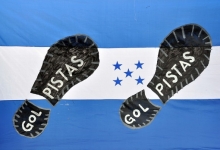The Honduran coup: Fiction and fact

Upside Down World | Wednesday, 29 July 2009
The Honduran Coup: Fiction and Fact
Written by Adrienne Pine
On June 28, the entire hemisphere suffered a blow to democracy with the military ouster of the constitutional president of Honduras, Manuel Zelaya. Since then, business groups behind the coup have waged an all-out PR war in Washington, even hiring Lanny Davis, former legal counsel for President Clinton and spokesperson for Secretary of State Hillary Clinton’s presidential campaign. As a result, there have been fabrications and distortions peddled by politicians and pundits which have aided in replacing facts with fiction.
Fiction: Zelaya was removed for orchestrating a power grab
Fact: Not a single action taken by Zelaya could have led to his remaining in power. The basis for this false claim was a non-binding citizen poll he had proposed to provide a recommendation to the National Congress, which would then have decided if it should allow Hondurans to vote in the general November election on the issue of whether to convene a citizen assembly to examine the constitution, after Zelaya’s term as president had finished.
Fiction: Both Zelaya’s removal and the “interim” government are constitutional
Fact: Nowhere in the Honduran constitution does it say that a president may be removed from office without due process. Rather, it states that no Honduran citizen (let alone a president) can be expelled from national territory. Arrest warrants are only legally permitted to be carried out by the civilian police, not the military. 25 legislators who opposed Zelaya’s ouster were not invited to the special Sunday session of Congress on June 28th in which the “interim president” was “unanimously” voted in. If the legal case against Zelaya was so strong, why was he denied due process?
Fiction: Zelaya is a Chavez puppet
Fact: Like most Latin American heads of state Zelaya has friendly diplomatic relations with Venezuela’s Chavez. He joined the Venezuelan proposed ALBA, a fair trade alternative to Washington’s now-defunct Free Trade Area of the Americas, as well as Petrocaribe, an agreement with Venezuela which provides much-needed low-cost fuel — an agreement which also includes other "rogue" nations such as the Bahamas and Jamaica. What this proves is that President Zelaya is working to provide for the disenfranchised and poor majority of his country.
Fiction: This is a struggle between Communism and Democracy
Fact: At no point did Zelaya propose anything resembling a communist political or economic system in Honduras. He did raise the minimum wage, provide accessible education, advocate access to land and decent housing in a way that could be called "socialist" just as U.S. fire and police departments can be called socialist. His actions provoked the ire of the Honduran elite, who have spent millions of dollars financing the coup and subsequently on D.C.-based lobbyists. The de facto government has remained in power through military force, targeted assassinations and disappearances overseen by 1980s death squad leaders, the violent suppression of all media not supporting the coup, the imposition of curfews and the terrorizing of the overwhelming majority of the population that opposes it. If anything, in terms of political systems, the current situation is a battle between a weak electoral democracy and fascism.
Fiction: This is a battle between Zelaya and “interim president” Micheletti
Fact: For many of the hundreds of thousands of Hondurans who have risked their lives to fight the coup, Zelaya is beside the point. Many are not even Zelaya supporters. They are protesting the takeover and militarization of their country by a small group of wealthy elites. The situation in Honduras today is not a power struggle between two Honduran strongmen; it’s a class war declared on the poor by the wealthy. The latter owns all the media, weapons, and institutions of government, including the public funds being depleted to fund the violent suppression of the people.
Fiction: Zelaya is inviting violence and "acting recklessly" by threatening to return
Fact: Zelaya was unconstitutionally removed from his post and his country. He has a legal and ethical right to return. If a threatened bloodbath were to occur, the blood would be solely on the hands of those who control all the guns, all the death squads, and all the institutions of violence: the coup government. The vast majority of Hondurans are unarmed, fear the military with its history of violent repression, and dreads civil war. Blaming Zelaya for a future bloodbath for trying to restore democracy is an absurd case of blaming the victim for the brutal plans of the current regime.
Fiction: Nothing’s going on here
Fact: The de facto regime claims all is normal, democracy is healthy, and human rights are respected. But citizen journalists and independent human rights groups such as the Committee for Relatives of the Detained-Disappeared, Amnesty International and Reporters without Borders have provided ample proof of targeted assassinations of coup opponents and journalists, instances of torture, military break-ins of private homes, and forced disappearances.
If we accept the lies supporting the violent attack on Honduran democracy, we only weaken our own. It is time that we, as Americans, demand the Obama Administration take concrete measures required by U.S. law in the case of a coup: removing their ambassador, ending all military alliances, and cutting off trade in order to push for the unconditional return of Honduras’s rightful president.
Adrienne Pine is a militant anthropologist, assistant professor at American University in D.C., and author of "Working Hard, Drinking Hard, on Violence and Survival in Honduras." She blogs at www.quotha.net.





